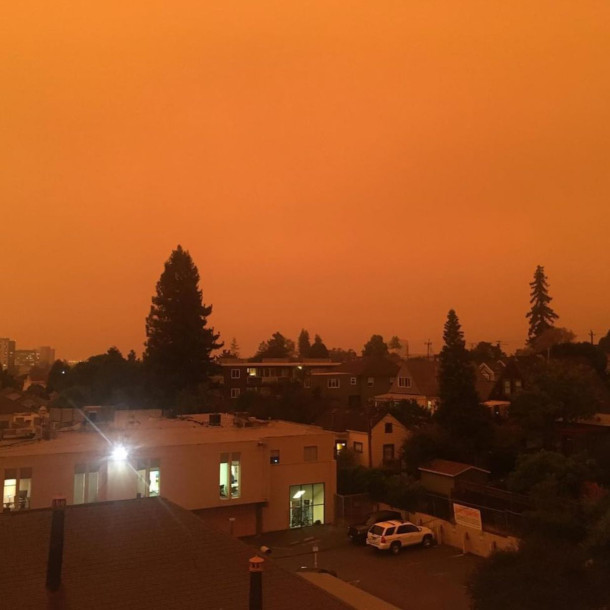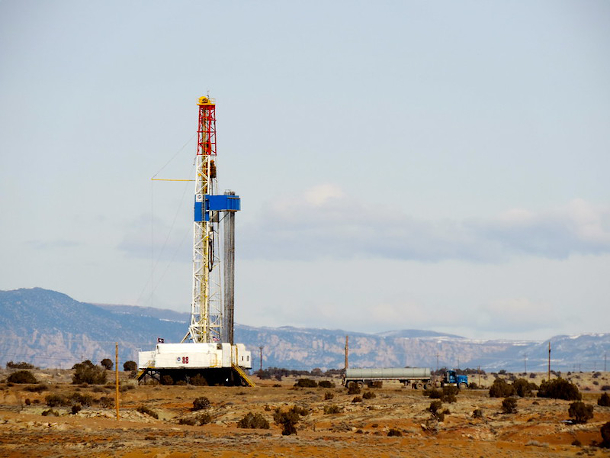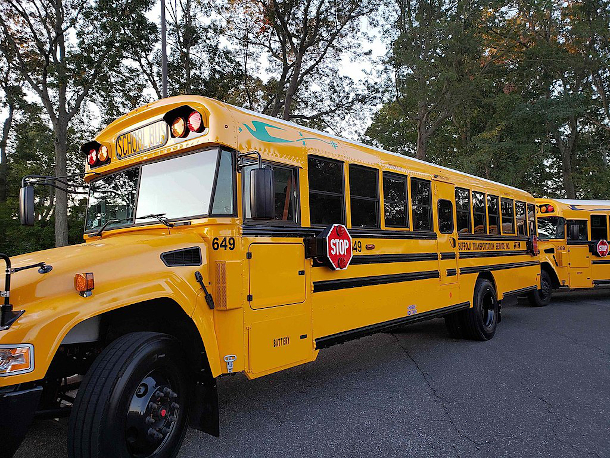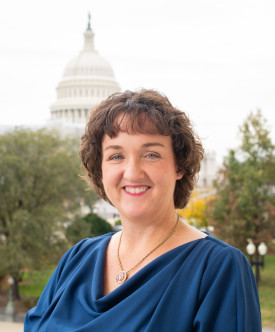Congress and Climate Action
Air Date: Week of February 11, 2022

The orange California sky resulting from wildfires in Oakland in 2020. (Photo: J Healey on Wikimedia Commons)
To pay for clean energy and climate resiliency investments needed to complement the infrastructure law passed last year, a group of House Democrats is calling for President Biden to push a revised budget reconciliation bill that can get all Senate Democrats on board, now that the omnibus package known as “Build Back Better” has been scuttled. Democratic Congresswoman Katie Porter of California joins Host Steve Curwood to explain as much as $1 trillion in Congressional budget climate action is needed over the next ten years to avert more climate disasters.
Transcript
BASCOMB: From PRX and the Jennifer and Ted Stanley studios at the University of Massachusetts Boston, this is Living on Earth. I’m Bobby Bascomb.
CURWOOD: And I’m Steve Curwood.
To pay for more climate action beyond that in the infrastructure law that already passed last year President Biden and the House Democrats tried to roll it into a broad $1.5 trillion package for budget reconciliation called Build Back Better to avoid filibuster in the Senate. But with a razor thin majority every Senate Democrat needed to sign on, and despite months of wrangling, they didn’t. So now a group of 23 House Democrats is calling for President Biden to push climate-centric measures in a revised budget reconciliation bill that can get all Senate Democrats on board. Congresswoman Katie Porter of California is part of this group. She is also Deputy Chair of the Congressional Progressive Caucus, and joins me now from Irvine, CA. Congresswoman Porter, welcome to Living on Earth!
PORTER: Thank you for having me.
CURWOOD: Our pleasure. So let's cut right to the chase here. How much of the half a trillion dollars that was originally part of the Build Back Better bill, or budget reconciliation, depending on whatever you want to call it -- How much of that should Congress spend on climate right now? And what are the costs of not making those investments?
PORTER: We definitely need to spend what we had allocated in the original Build Back Better Act. And I'm hopeful that we will see climate be prioritized in whatever budget reconciliation bill we move forward with. We know we're starting over, we have to have new conversations and new negotiations, but nothing about the climate problem has gone away. So nothing about climate solutions needs to change. And if anything, the point I make over and over again, is the longer we delay, the more difficult it is to solve our climate crisis, the more expensive it becomes to solve our climate crisis. And the fewer options we have to solve our climate crisis. So when we talk about comparing the costs of addressing climate change, we have to measure that against the costs of inaction.
CURWOOD: So give us some of those numbers, please.
PORTER: Well, let me give you one example: weather and climate-related disasters cost taxpayers $145 billion, just in 2021, just last year. $145 billion, and that money basically is gone. It goes into one-time repairs, it goes into fixing things up; it's disaster response. If we instead invested that money in preventing disasters, in coastal resilience, for example, and wildfire prevention, and things like that we could actually not only save that money, but we'd be spending it in a way that is creating jobs, that is keeping first responders out of harm's way. It's really, really important to understand, climate change is happening, whether Congress does something about it or not. And it is costing taxpayers. So the fiscally responsible thing to do is to pass science based policy that will effectively address climate change.
CURWOOD: This has hit you personally, I gather there have been some wildfires out there in California. How did that affect you?
PORTER: Yes, so we had wildfires here, two of them in the last year or two alone. And during the pandemic in particular, it was very difficult, because people were in their homes, they weren't able to necessarily travel or leave. Evacuations were more difficult, but the air quality was so terrible that they were unable to have kids come into school, they had to cancel recesses. And so that has real health costs to people in terms of triggering asthma, triggering respiratory disease. We also had an oil leak off the coast of Huntington Beach here in Orange County. And that's another area where it is expensive to keep subsidizing the fossil fuel industry, which very often pollutes and leaves taxpayers to foot the bill. So that is another big part of what was in the Build Back Better Act, including my legislation to update the rental and royalty rate. Because today taxpayers are spending a lot to subsidize the fossil fuel industry, rather than subsidizing or investing in, I should say, forward-looking clean energy job creation.

The climate policies that are in play in Congressional negotiations include an increase in the minimum onshore royalty rate for federal oil and gas leasing from 12.5% to 20%. (Photo: WildEarth Guardians, CC BY-NC-ND 2.0)
CURWOOD: To what extent are you expecting to have an element of the new budget reconciliation bill that considers climate that would reduce, I dare not say eliminate, subsidies for the fossil fuel industry? I mean, that's a tough hill to climb, given the power that industry has there in Congress.
PORTER: Well, the good news is we have seen major changes in people being willing to really dig in and look at, what is the fossil fuel industry doing? And I'll just offer a couple I think examples that should, should make us feel like we are making progress on this, despite their incredible lobbying power, which you correctly note. The Oversight and Reform Committee that I serve on had the Big Oil CEOs come in for a hearing this last year. And that was the first time that Big Oil has ever testified before Congress. The fact that we're having those hearings on what has Big Oil's said about climate pledges versus what are they actually doing, on issues like greenwashing, that's very encouraging. The other thing I'll note is the effort to make sure that when we lease public land, or public water, for drilling, or for mining that we are getting a fair return is actually bipartisan in the Senate. It's Jacky Rosen, a Democrat from Nevada, and Chuck Grassley, a Republican from Iowa. You often hear about tax fairness as an important issue from both sides of the aisle. This is something that we should be able to agree on.
CURWOOD: I'm going to come back to the proposed legislation in a moment, but let's go further on the question of using public lands. One of the things that President Biden's administration did right around the time of COP26 was go ahead with authority to lease 80 million acres in the Gulf of Mexico. And I think ExxonMobil and Chevron snapped up nearly 2 million acres of that. I mean, the White House says, Well, there's a court decision that forced us to do this. But it doesn't exactly sound like the President's pledge to stop using public lands to increase climate risk.
PORTER: Well, I think there are a couple different things going on. One is that it was positive that President Biden put a pause in place. And as you note, there was litigation that forced that planned sale to go on. But the report that the administration put out on the use of public lands for oil drilling contains some really important fact finding, and really makes the case for why we need to get a fair return. And so I have a lot of confidence in Secretary of Interior Deb Haaland, my former Congressional colleague, to take positive steps. But there are real issues with regard to some of the agencies, including the Bureau of Land Management and others, who often have had a very longstanding and frankly, quite close relationship with extractive industries, whether that's logging, or fossil fuel. So I do think we need to rethink this, as President Biden talks about preserving 30% of our public land by 2030. What we need to have is forward-looking energy policy that is honest about the reality of the climate crisis.

Congresswoman Katie Porter (D-CA) says funding for more electric school buses is an important part of federal climate legislation that should be included in the upcoming budget reconciliation bill. (Photo: UniversityRailroad, Wikimedia Commons CC BY-SA 4.0)
CURWOOD: What are the elements that need to be in this rewritten budget resolution, the child of Build Back Better, we might call it, in terms of the climate? What are the top priorities?
PORTER: Well, one of the things we have to do is remember that the Jobs and Infrastructure bill, the bipartisan one that President Biden signed that is law, was never designed to exist on its own. It was always to be paired with the climate activity in Build Back Better. And that is because transportation is our biggest source of emissions for fossil fuel. So we were always intending, for example, even as we repair roads and bridges in the infrastructure bill, to pair that with investments in Build Back Better in things like electric vehicles, you know, electric school buses, with things like carbon recapture. And when we talk about job creation, infrastructure jobs are real, and they are happening around the country because of that bipartisan infrastructure bill. But those are jobs for one sector and one segment; they're often, you know, they exist for a certain period of time, and then the bridge is built or the dam is repaired. Clean and green energy jobs are jobs that can sustain our economy for the next 100 years.
CURWOOD: Now Congresswoman, is there a number that you associate that would take care of getting those things funded that need to be done in tandem with the already enacted infrastructure bill? How much money are we talking about here, do you think?
PORTER: Well, I would say that, at minimum, we ought to be thinking about $500 billion dollars. The overall Build Back Better Act was $1.5 trillion, I think we want no less than a
third of that to be related to climate. But I would say, you know, somewhere upwards of $500 billion, $750 billion. If it's done right, and we are making long-term plans, I think we could even do a trillion on green energy and climate and, and really come out ahead in our economy going forward. People also have to remember, that is over 10 years. So it is important that we do not do something that is one year spending, then not doing it, because the cost of turning on these investments, and then stopping them is incredibly expensive. Science doesn't work that way. We want to be asking ourselves, How much do we want to be spending in year 10? And I think that pushes us toward having the fiscally responsible thing be a bigger number that's closer to a trillion dollars overall.

Representative Katie Porter (D-CA) poses in front of the U.S. Capitol building for her official photo for the U.S. House of Representatives. (Photo: U.S. House of Representatives)
CURWOOD: By the way, how do the climate initiatives that were originally outlined in the Build Back Better bill that you and your colleagues passed through the House, how does that advance environmental justice?
PORTER: Yes, so part of this is a very explicit commitment by President Biden, to make sure that resources devoted to investing in clean energy and invested in environmental remediation are going to the communities that were most affected. And I think this has a couple different parts. One of the things that we need to do is recognize that some of the most important environmental activists we have in our country right now are black, indigenous and people of color because they are living closest, in so many cases, to the pollution. And they have firsthand been experiencing both the health harms, the community harms, the environmental degradation. And so we want to make sure that those are the communities that are also leading the way and being powerful voices in thinking about how to address and remediate the situation. This is also a huge opportunity to create jobs because the people who often work in the fossil fuel industry, many of them are lower wage workers. So when we talk about a just transition, how are we going to train and locate the training opportunities, the apprenticeships, the pathways to career success in the communities that are at risk of losing jobs as we make that, that transition.
CURWOOD: I'd like you to drill down on the health implications of this climate legislation. Folks at the Harvard School for Public Health say that about 300,000 Americans die each year from breathing air that has gone through internal combustion engines and other uses of fossil fuels. So to what extent would this legislation cut that death rate? Yeah,
PORTER: Yeah, and by the way, those deaths are often through chronic disease. And so they're not only painful and difficult and loss of lives, but there's often years of treatment, of medication; it's the loss of life, it's also the amount of resources in our healthcare system that we're putting into caring for sick people rather than investing in from a public health standpoint, and from a healthcare standpoint, in keeping people healthy. So, over time, can we bring that number down from 300,000 to 200,000? Absolutely. Is it going to go to zero? No. But we need to be showing the American people the pathway to making progress. And it's not going to happen if we continue to allow big oil companies to write our energy policy.
CURWOOD: Congresswoman Katie Porter represents California in Orange County, I think it's the 45th District. She's also Deputy Chair of the Congressional Progressive Caucus. Congresswoman, thanks so much for taking the time with us today.
PORTER: Thank you for the conversation.
Links
House Democrats’ Letter on Climate to President Biden
Rep. Katie Porter Breaks Down the Build Back Better Act
Energy and the Environment page on Katie Porter's website
Whitehouse.gov: The Build Back Better Framework
Center for Climate and Energy Solutions: Build Back Better for Climate and Energy
Living on Earth wants to hear from you!
Living on Earth
62 Calef Highway, Suite 212
Lee, NH 03861
Telephone: 617-287-4121
E-mail: comments@loe.org
Newsletter [Click here]
Donate to Living on Earth!
Living on Earth is an independent media program and relies entirely on contributions from listeners and institutions supporting public service. Please donate now to preserve an independent environmental voice.
NewsletterLiving on Earth offers a weekly delivery of the show's rundown to your mailbox. Sign up for our newsletter today!
 Sailors For The Sea: Be the change you want to sea.
Sailors For The Sea: Be the change you want to sea.
 The Grantham Foundation for the Protection of the Environment: Committed to protecting and improving the health of the global environment.
The Grantham Foundation for the Protection of the Environment: Committed to protecting and improving the health of the global environment.
 Contribute to Living on Earth and receive, as our gift to you, an archival print of one of Mark Seth Lender's extraordinary wildlife photographs. Follow the link to see Mark's current collection of photographs.
Contribute to Living on Earth and receive, as our gift to you, an archival print of one of Mark Seth Lender's extraordinary wildlife photographs. Follow the link to see Mark's current collection of photographs.
 Buy a signed copy of Mark Seth Lender's book Smeagull the Seagull & support Living on Earth
Buy a signed copy of Mark Seth Lender's book Smeagull the Seagull & support Living on Earth

